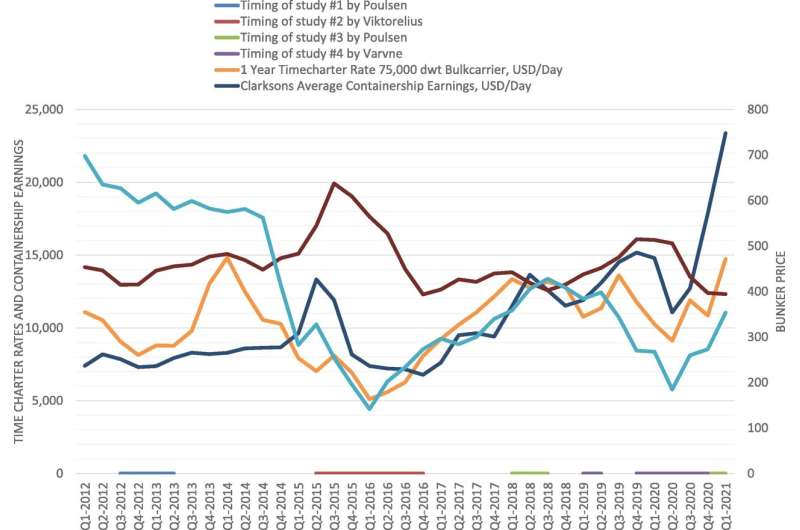Commercial interests hamper climate work in shipping

Instead of prioritizing energy-efficient, sustainable sea transport, the focus is often on satisfying commercial interests when planning shipping routes. This has been shown by research at the University of Gothenburg, published in Transportation Research Part D: Transport and Environment, which highlights the importance of collaboration for more sustainable shipping.
Shipping accounts for around 90 percent of the world’s transport and almost three percent of total emissions of carbon dioxide and other greenhouse gases. To reduce the climate impact of shipping, the UN’s International Maritime Organization (IMO) has agreed that international shipping should reduce its greenhouse gas emissions by 50 percent by 2050, compared to 2008 levels.
To achieve this climate goal, the IMO uses a ship-based regulatory approach to promote safer, more energy-efficient shipping. However, a study carried out by the School of Business, Economics and Law at the University of Gothenburg and three other Nordic universities shows the limitations of this approach.
“These limitations are slowing down climate work and may be part of the reason why carbon emissions from shipping are continuing to rise,” explains Hanna Varvne, a doctoral student in business administration and one of the study’s authors.
Commercial interests are prioritized
Before setting off on a voyage, captains and officers make a number of decisions that affect energy efficiency. By planning a route with favorable weather and sea conditions, optimizing main and auxiliary engines, and avoiding delays in connection with departure, fuel consumption and climate impact can be minimized.
However, the study shows that these choices are often influenced by instructions from commercial managers, ship operators and cargo owners, who prioritize economic factors over energy efficiency.
“They may want to see high service speeds, frequent ferry services during the low season or a longer route that avoids expensive canal charges, all of which increase fuel consumption,” continues Hanna Varvne.
By not taking into account these decision-makers who prioritize commercial interests over energy efficiency, the regulatory approach could have a negative impact on the chances of achieving the 2050 climate goal, according to the researchers.
“A classic example is the speed of the vessel. This is often regulated either in commercial contracts or via public procurement. These contracts take limited account of which speed would result in reduced emissions.”
The importance of raising the minimum level
To achieve shipping’s climate goals, the researchers therefore recommend that the IMO should focus more on commercial managers, port stakeholders and other decision-makers that currently prioritize commercial goals over energy efficiency. Hanna Varvne also believes that more cooperation is needed to achieve the climate goal:
“There are a number of new agreements between cargo owners and shipping companies that aim to create more environmentally friendly transport chains. Unfortunately, there are also examples of other arrangements or collaborations that have not succeeded. So future research on the success factors for working together for sustainable shipping could really contribute to developing more successful projects that benefit both businesses and the environment.”
The study is based on interviews with more than 100 maritime officers and managers, as well as extensive observations from vessels and data collection.
Tracking greenhouse gas emissions from ships in the Great Lakes-St. Lawrence Seaway
René Taudal Poulsen et al, Energy efficiency in ship operations – Exploring voyage decisions and decision-makers, Transportation Research Part D: Transport and Environment (2021). DOI: 10.1016/j.trd.2021.103120
Citation:
Commercial interests hamper climate work in shipping (2022, March 31)
retrieved 1 April 2022
from https://phys.org/news/2022-03-commercial-hamper-climate-shipping.html
This document is subject to copyright. Apart from any fair dealing for the purpose of private study or research, no
part may be reproduced without the written permission. The content is provided for information purposes only.
For all the latest Science News Click Here
For the latest news and updates, follow us on Google News.

